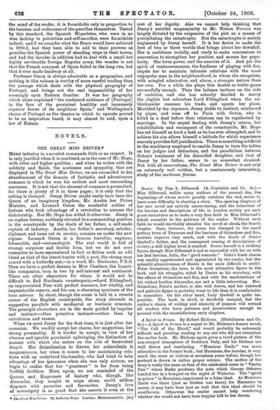Desire. By Una L. Silberrad. (A. Constable and Co. Cs.)—
Miss Silberrad, unlike many authors of the present day, the beginnings of whose novels greatly outshine the end, seems to have some difficulty in starting a story. The opening chapters of her new novel are entirely unconvincing, and the behaviour of the heroine and descriptions of life in London society are such gross caricatures as to make a very firm faith in Miss Silberrad's talent essential to the patience of the reader. Without such faith he would inevitably abandon the novel at about the fourth chapter. Once, however, the scene has changed to the small pottery town of Twycross and the business of Grimstone and Son, matters improve very much, and with the death of Desire Quebell's father, and the consequent ceasing of descriptions of society, a still higher level is reached. Desire herself is a striking figure, though Miss Silberrad is not so successful with her as with her last heroine, Julia, the "good comrade." Julia's frank charm was readily apprehended and appreciated by the reader, but the splendid attractiveness of Desire is far more difficult to credit Peter Grimstone, the hero, is the most attractive figure in the book, and his struggles, aided by Desire as his secretary, with the affairs of Grimstone and Son, and with the machinations of his wicked brother Alexander, are not a little interesting. Mrs. Grimstone, Peter's mother, is also well drawn, and her subdued and pathetic figure is probably truer to life than it is comfortable to remember. On the other hand, Lady Quebell is quite im- possible. The book, in short, is decidedly unequal, but the author's charm of writing and sincerity of purpose will reward all readers who have patience and perseverance enough to proceed with the unsatisfactory early chapters.














































 Previous page
Previous page